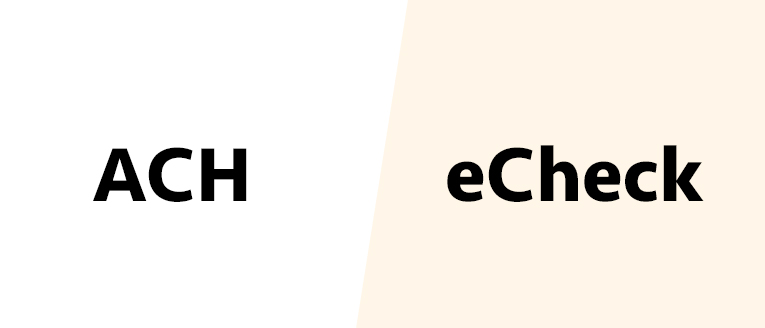
| July 25th, 2022 |
Do You Know How ACH And eChecks Are Different?
eChecks and ACH are pretty similar, and both terms are used interchangeably. ACH works as the ‘Automated Clearing House’ network, the process used for transferring money electronically from one bank account to another. An eCheck is the short form of “electronic check,” and it remains the most critical payment method because of the process.
ACH Processing:
With the help of an automated clearing house, you shall use the information linked to your bank account to manage payments. ACH is used to designate a credit to your account, including direct deposit from your job. ACH also helps in making it easier and more convenient to pay bills. For an assumption, when a consumer pays for the bill through the power company, he must use their account and routing number. This is the overall significance that ACH carries.
eChecks:
Electronic checks remain similar to paper checks and do not remain in the bank’s obligation. Moreover, they combine the transaction and authorization within the same document. Sometimes, the bank also makes the payment to receive approval for the transaction. As a result, eCheck allows banks to handle risks conveniently and remains applicable for any customer using a checking account. This is why electronic checks remain popular among small and medium businesses.
Major Difference between ACH and eCheck services:
The main distinction between ACH and eChecks is that the party can keep the payment information and send the payments directly. For an assumption, ACH is managed by specific entities to put on the enrollment forms to establish a recurring debit from their chosen account. It will help in processing monthly or quarterly debits and is used for updating the payment amount for customers who use it.
Electronic checks and ACH are similar and showcase different transaction types based on several business models. Their information flow remains various, and several legalities surround them. Their information flow remains different and remains distinct in terms of risk management. It stays good for consumers and merchants, allowing other services and products to meet different needs and requirements. Electronic checks are entirely based on newer technology and did not remain in existence when ACH was introduced primarily.
ACH payments are electronic transfers that rely upon bank routing numbers and bank account information to transfer payments between two or more banking institutions.
It usually takes around 1 to 3 business days to process ACH transactions. Therefore, ACH payments are favored for their lower costs than wire transfers or debit cards.
ACH payments are usually used for recurring fees, direct deposits, and large-sized transactions. In addition, the bank information provided for ACH payments gets stored for future online payments.
ACH and eCheck processing usually takes some time, like one to three business days. eChecks work as one-off payments and several steps are required to verify and be authorized. Next, the merchant account needs the green light to process the eCheck through the ACH network. Finally, the eCheck is submitted and can take around 24-48 hours. eChecks usually take about two to five days to process.
Moreover, different payment processing providers carry other processing fees, and giving traditional values becomes difficult. So, this is why it remains widespread to attract additional processing since there remain no extra steps involved in eCheck processing verification. eChecks that usually bounce also fetch extra processing fees. On the other side, ACH return and chargeback fees can be applied in this case. They also differ and depend upon merchant services accounts.
Similarities Between eCheck and ACH payments-
Since we have highlighted the differences, their similarities will become evident. ACH payments and eCheck processing services are processed through the ACH network. Both work with electronic funds transfer to transfer funds from one financial institution to another. They move from one bank to another apart from traditional payment processing in which credit card payment is involved between them.
Conclusion:
ACH payments should be considered essential for accepting eCheck Payment Processing Services. The processing fees are low and high in security, and I greatly appreciate the convenience. In addition, transfer originates straight from customers’ accounts other than their cards and allows them to avoid specified fees, and the same set of benefits are offered to merchants.
So, implementing these payment solutions is simple, and merchants can easily set up an ACH payment gateway that facilitates the ACH payment process through a suitable payment processor. With this setup, merchants can request customers’ authorization to utilize this payment method. This is why payment details are usually set up, and the payment information gets submitted.
